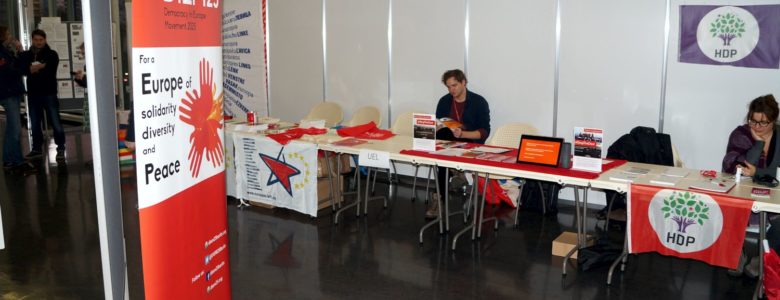
DSC Berlin at the congress of the European Left
380 delegates from 27 member parties and from nine observation parties arrived in Berlin for the 5th Congress of the European Left. Their concerns about Europe were connected: austerity politics, growing precariousness, the rise of the populous right and higher military budgets for geopolitical power games (just to name a few). Europe is standing knee deep in crises and this is not just from the viewpoint of the Left. The question, however, of “what to do?”, brought an end to the agreement among those present.
Gregor Gysi, still chairman in the German Bundestag, was elected as the new chairman of the European Left. Without opponents, Gysi can only have a short majority of the delegates behind him, with only 68% of the votes, and the EL made a rather split impression.
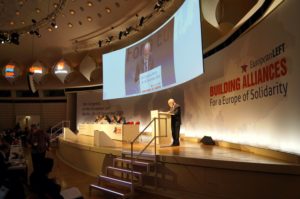
Naturally, DiEM25 wasn‘t officially invited to the Congress. Through “Die Linke”, however, there was a chance to set up a stand and present the proposals of our Pan-European democratic movement to the interested delegates and representatives.
Despite being just one of many stands using the color red at the event, the DiEM stand nevertheless stood out clearly. During the three-day congress, 8 DSC members alternated regularly at the stand and radiated a relaxed and cheerful atmosphere.
Carpe DiEM!
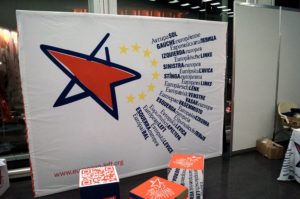
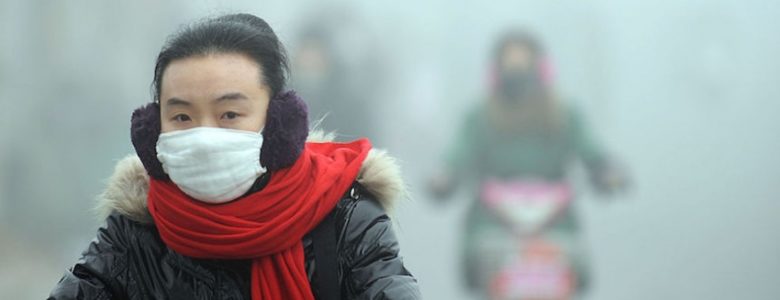
Slavoj Žižek: Lessons From the “Airpocalypse”
On China’s smog problem and the ecological crisis.
In December 2016, smog in big Chinese cities became so thick that thousands fled into the countryside, trying to reach a place where one could still see blue sky—this “airpocalypse” affected half a billion people. For those who remained, moving around began to resemble life in a post-apocalyptic movie: people walking around with large gas masks in a smog where even nearby trees were invisible. The class dimension played a crucial role: Before the authorities had to close airports because of the bad air, those who could afford an expensive flight abandoned the affected cities. And, to add insult to injury, Beijing’s lawmakers considered listing smog as a meteorological disaster, an act of nature, not an effect of industrial pollution, to prevent blaming the authorities for the catastrophe. A new category was thus added to the long list of refugees from wars, droughts, tsunamis, earthquakes, economic crises, etc.—smog refugees.
Perhaps the most surprising thing about this airpocalypse is its quick normalization: After the authorities could no longer deny the problem, they established procedures that would somehow enable people to continue their daily life by way of following new routines, as if the catastrophic smog were just a new fact of life. On designated days, you try to stay at home as much as possible and, if necessary, walk around with masks. Children rejoice in the news that on many days schools are closed—an opportunity to stay at home and play. Making a trip to the countryside, where the blue sky is still visible, becomes a special occasion one looks forward to (there are already agencies in Beijing specialized for such one-day trips). The important thing is not to panic and to maintain the appearance that, in spite of all troubles, life goes on …
One thing is sure: An extraordinary social and psychological change is taking place right in front of our eyes—the impossible is becoming possible. An event first experienced as impossible but not real (the prospect of a forthcoming catastrophe which, however probable we know it is, we do not believe will effectively occur and thus dismiss as impossible) becomes real but no longer impossible (once the catastrophe occurs, it is “renormalized,” perceived as part of the normal run of things, as always-already having been possible). The gap which makes these paradoxes possible is the one between knowledge and belief: we know the (ecological) catastrophe is possible, probable even, yet we do not believe it will really happen.
Recall the siege of Sarajevo in the early 1990s: The fact that a “normal” European city of half a million inhabitants will be encircled, starved, regularly bombed, its citizens terrorized by sniper fire, etc., and that this will go on for 3 years, would have been considered unimaginable before 1992—it would have been extremely easy for the Western powers to break the siege and open a small safe corridor to the city. When the siege began, even the citizens of Sarajevo thought this is a short-term event, trying to send their children to safety “for a week or two, till this mess is over.” And then, very fast, the siege was “normalized.” This same passage from impossibility to normalization (with a brief intermediary stage of panicky numbness) is clearly discernible in how the U.S. liberal establishment reacted to Trump’s victory. It is also clearly at work in how state powers and big capital relate to ecological threats like the ice meltdown on the poles. The very same politicians and managers who, until recently, dismissed the fears of global warming as the apocalyptic scare-mongering of ex-Communists, or at least as premature conclusions based on insufficient evidence, assuring us that there is no reason for panic, that, basically, things will go on as usual, are now all of a sudden treating global warming as a simple fact, as part of the way things are “going on as usual” …
In July 2008, CNN was repeatedly showing a report “The Greening of Greenland,” celebrating the new opportunities that the melting of ice offers to Greenlanders—they can already grow vegetables in the open land, etc. The obscenity of this report is not only that it focuses on the minor benefit of a global catastrophe; it also plays on the double meaning of “green” in our public speech (“green” for vegetation; “green” for ecological concerns), so that the fact that more vegetation can grow on the Greenland soil because of global warming is associated with the rising of ecological awareness. Are such phenomena not yet another example of how right Naomi Klein was when, in her Shock Doctrine, she described the way global capitalism exploits catastrophies (wars, political crises, natural disasters) to get rid of the “old” social constraints and impose its agenda on the slate cleared by the catastrophe? Perhaps, the forthcoming ecological disasters, far from undermining capitalism, will serve as its greatest boost.
What gets lost in this shift is the proper sense of what is going on, with all the unexpected traps the catastrophe hides. For example, one of the unpleasant paradoxes of our predicament is that the very attempts to counteract other ecological threats may contribute to the warming of the poles: the ozone hole helps shield the interior of the Antarctic from global warming, so if it is healed, the Antarctic could quickly catch up with the warming of the rest of the Earth… One thing at least is sure. In the last decades, it was fashionable to talk about the predominant role of “intellectual labor” in our postindustrial societies—however, materiality is now reasserting itself with a vengeance in all its aspects, from the forthcoming struggle for scarce resources (food, water, energy, minerals) to environmental pollution.
Even when we profess the readiness to assume our responsibility for ecological catastrophes, this can be a tricky stratagem to avoid the true dimensions of a catasatrophe. There is something deceptively reassuring in this readiness to assume the guilt for the threats to our environment: We like to be guilty since, if we are guilty, then it all depends on us, we pull the strings of the catastrophe, so we can also save ourselves simply by changing our lives. What is really difficult for us (at least for us in the West) to accept is that, as individuals, we are reduced to a purely passive role of those who can only sit and watch what our fate will be—to avoid such a situation, we are prone to engage in a frantic obsessive activity, recycle old paper, buy organic food, whatever, just so that we can be sure that we are doing something, making our contribution—like a soccer fan who supports his team in front of a TV screen at home, shouting and jumping from his seat, in a superstitious belief that this will somehow influence the outcome.
It is true that the typical form of fetishist disavowal apropos ecology is: “I know very well (that we are all threatened), but I don’t really believe it (so I am not ready to do anything really important like changing my way of life).” But there is also the opposite form of disavowal: “I know very well that I cannot really influence the process which can lead to my ruin (like a volcanic outburst), but it is nonetheless too traumatic for me to accept this, so I cannot resist the urge to do something, even if I know it is ultimately meaningless.” Is it not for the same reason that we buy organic food? Who really believes that the half-rotten and expensive “organic” apples are really healthier? The point is that, even if they really are healthier (and many of them probably are), we buy them because by way of buying them, we do not just buy and consume a product—we simultaneously do something meaningful, show our care and global awareness, we participate in a large collective project.
We have to finish with such games. The airpocalypse in China is a clear indication of the limits of our predominant environmentalism, this strange combination of catastrophism and routine, of guilt-feeling and indifference. Ecology is today one of the major ideological battlefields, with a whole series of strategies to obfuscate the true dimensions of the ecological threat: (1) simple ignorance: It’s a marginal phenomenon, not worthy of our preoccupation, life (of capital) goes on, nature will take care of itself; (2) science and technology can save us; (3) leave the solution to the market (higher taxation of the polluters, etc.); (4) superego pressure on personal responsibility instead of large systemic measures: Each of us should do what he/she can—recycle, consume less, etc.; (5) maybe the worst of them all – worst in its ideological effects – is the advocating of a return to natural balance, to a more modest, traditional life by means of which we renounce human hubris and become again respectful children of our Mother Nature.
Does the predominant ecological discourse not address us as a priori guilty, indebted to mother nature, under the constant pressure of the ecological superego-agency which addresses us in our individualty: “What did you do today to repay your debt to nature? Did you put all newspapers into a proper recycle bin? And all the bottles of beer or cans of Coke? Did you use your car where you could have used a bike or some means of public transport? Did you use air conditioning instead of just opening wide the windows?” The ideological stakes of such individualization are easily discernible: I get lost in my own self-examination instead of raising much more pertinent global questions about our entire industrial civilization. Plus one should note how this culpabilitization is immediately supplemented by an easy way out: recycle, buy organic food, use renewable energy, etc., and you no longer have to feel guilty, you can enjoy your life as usual.
Another trap to be avoided is the moralizing anti-capitalism—all the talk about how capitalism is sustained by the egotist greed of individual capitalists for more power and wealth. In actual capitalism, personal greed is subordinated to the impersonal striving of the capital itself to reproduce and to expand. One is thus almost tempted to say that what we really need is more, not less, enlightened egotism. Take the ecological threat: no pseudo-animistic love for nature is needed to act here, just a long-term egotist interest. The conflict between capitalism and ecology may appear to be a typical conflict between pathological egotistic-utilitarian interests and the properly ethical care for the common good of humanity. Upon a closer look, it immediately becomes clear that the situation is exactly the opposite one: It is our ecological concerns that are grounded in the utilitarian sense of survival: They simply stand for the enlightened self-interest, at its highest for the interest of the future generations against our immediate interest. The New Age spiritualist notion of the sacredness of life as such, of the right of environment to its preservation, etc., plays no necessary role in our ecological awareness. If we are looking for the ethical dimension in this entire affair, it is to be found in capitalism’s unconditional commitment to its own ever-expanding reproduction: a capitalist who dedicates himself unconditionally to the capitalist self-expansive drive is effectively ready to put everything, including the survival of humanity, at stake, not for any “pathological” gain or goal, but just for the sake of the reproduction of the system as end-in-itself. Fiat profitus pereat mundus (let profits be made, though the world perish) is what we presume to be its motto. This ethical motto is, of course, weird, if not outright evil—however, from a strict Kantian perspective, we should not forget that what makes it repulsive to us is our purely “pathological” survivalist reaction: a capitalist, insofar as he acts “in accordance with his notion,” is someone who faithfully pursues a universal goal, without regard for any “pathological” obstacles.
So what is to be done, as Lenin would have put it? In his What Happened in the XXth Century?, Peter Sloterdijk provides his own outline of what is to be done in the XXIst century, best encapsulated in the titles of the first two essays in the book, “The Anthropocene” and “From the Domestication of Man to the Civilizing of Cultures.”
“Anthropocene” designates a new epoch in the life of our planet in which we, humans, cannot any longer rely on the Earth as a reservoir ready to absorb the consequences of our productive activity: We cannot any longer afford to ignore the side effects (collateral damage) of our productivity, they cannot any longer be reduced to the background of the figure of humanity. We have to accept that we live on a “Spaceship Earth,” responsible and accountable for its conditions. Earth is no longer the impenetrable background of our productive activity, it emerges as a(nother) finite object that we can inadvertently destroy or transform to make it unlivable. This means that, at the very moment when we become powerful enough to affect the most basic conditions of our life, we have to accept that we are just another animal species on a small planet – what enforces this acceptance is our very global destructive power. A new way to relate to our environs is necessary once we realize this: no longer a heroic worker expressing his/her creative potentials and drawing from the inexhaustible resources from his/her environs but a much more modest agent collaborating with his/her environs, permanently negotiating a tolerable level of safety and stability.
Is the very model of ignoring the collateral damage not capitalism? What matters in capitalist reproduction is the self-enhancing circulation focused on profit, and the collateral damage done to the environs not included into costs of production is in principle ignored—even the attempts to take it into account through taxation (or by way of directly putting a price tag on every natural resource one uses, including air) cannot but misfire. So in order to establish this new mode of relating to our environs, a radical politico-economic change is necessary, what Sloterdijk calls “the domestication of the wild animal Culture.” Till now, each culture educated and disciplined its own members and guaranteed civic peace among them in the guise of state power, but the relationship between different cultures and states was permanently under the shadow of potential war, with each state of peace nothing more than a temporary armistice. As Hegel conceptualized it, the entire ethic of a state culminates in the highest act of heroism, the readiness to sacrifice one’s life for one’s nation-state, which means that the wild barbarian relations between states serve as the foundation of the ethical life within a state. Is today’s North Korea, with its ruthless pursuit of nuclear weapons and rockets to hit with them distant targets, not the ultimate caricature of this logic of unconditional Nation-State sovereignty?
The moment we fully accept the fact that we live on a Spaceship Earth, the task that urgently imposes itself is that of civilizing civilizations themselves, of imposing universal solidarity and cooperation among all human communities, a task rendered all the more difficult by the ongoing rise of sectarian religious and ethnic “heroic” violence and readiness to sacrifice oneself (and the world) for one’s specific Cause. The overcoming of capitalist expansionism, wide international cooperation and solidarity should also be able to transform itself into an executive power ready to violate state sovereignty, etc. Are these not all measures destined to protect our natural and cultural commons? If they do not point towards communism, if they do not imply a communist horizon, then the term “communism” has no meaning at all.
Originally published in In These Times.
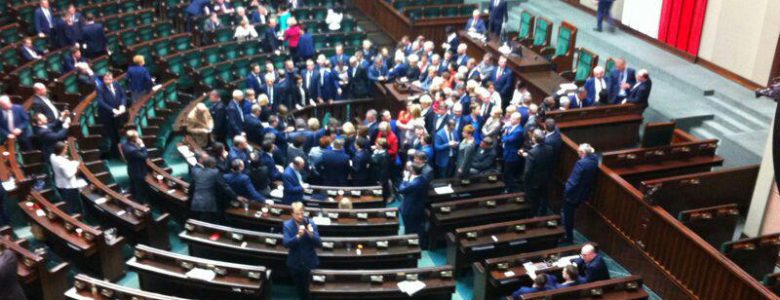
Poland, you won’t be left alone
By Igor Stokfiszewski
Today ended a three-week occupation of the plenary room of the lower house of the Polish parliament (Sejm), undertaken by deputies of two opposition parties (the ex-ruling Platforma Obywatelska [Civic Platform] and new liberal Nowoczesna [Modern]).
This phase of Poland’s parliamentary crisis is over, but Poland remains stuck in a much deeper one – the crisis of far-right authoritarian rule, of representative parliamentary politics and of democracy itself.
The deputies began their occupation to protest against the anti-democratic actions of the ruling far-right Law and Justice party which, with its total parliamentary majority, hold on government and the Poland’s presidency, aims to subordinate the social, political, end economic lives of millions of Poles. Driven by conservative, religious and nationalistic views, the party is bypassing rule of law, dismantling the basis of a democratic state and demolishing the customs of political dialogue.
The occupation started because a deputy from an opposition party was excluded from the debate over the country’s budget by the Sejm Speaker. The reason: the deputy held a banner at the debate calling for media freedom, against the recent announcement of parliamentary authorities to restrict journalist access to Polish parliament proceedings.
After the deputy was excluded, opposition party politicians blocked the plenary room’s rostrum intending to break up the session. The session was moved to Sejm’s Column Hall where the budget was voted through (illegally, according to opposition party politicians, many commentators and observers, who raised questions on whether the minimum number of MPs needed to vote had been met).
Over the next days, thousands of people gathered in front of Polish parliament building to support the deputies that were resisting. The deputies continued to occupy the plenary room, until January 12 when the occupation was suspended to open space for dialogue on resolving the matter: media access to parliament proceedings and the legality of the 2017 Polish budget act.
The protest of deputies was supported by thousands of Polish citizens, social movements and the extra-parliamentary political opposition. DiEM25 has been closely following the developments of political crisis in Poland. We have been expressing our support for the protests of Polish people, providing international attention to (among others) the Women’s Strike of October 3, 2016, and our making clear our concerns for the future of democracy in Poland.
At the same time, we’ve been witnessing how the EU institutions were unable to adequately support Polish democratic forces in their efforts to challenge far right authoritarianism. Until now, no EU actor – neither the European Parliament, the European Commission nor the European Council headed by Poland’s own ex-PM – has contributed to this latest democratic struggle of the social and political opposition forces in Poland. Their inaction is a symptom of the corrosion of EU democracy itself.
Therefore, we once again express our support for democratic movements, organisations and political parties in Poland, and appeal to our European allies not to leave Polish people alone in their struggles for dignity, equality and democracy. Yanis Varoufakis stated on January 2 that “Poland will be a major battleground for progress and liberty in 2017. DiEM25 will be there!”. We invite all the democrats of Europe to be there with us.

Yanis Varoufakis: A Greek warrior sets sights on a new battle
Having lost the old fight over Greece’s financial future, Mr. Varoufakis is focused on a different cause: preserving the European Union
The explosive public career of Yanis Varoufakis started in January, 2015, and ended less than six months later, when he resigned as Greek finance minister after accusing his boss, Prime Minister Alexis Tsipras, of wholesale sellout – “surrender,” he called it – to Greece’s bailout overlords. Like a Greek Mad Max, the world’s most famous finance minister at the time, true to his theatrical style, swung his leg over his high-powered Yamaha and fled the corruption and decay of Athens with a roar of the motorcycle’s engine.
His exit meant that the high-stakes game that could have seen Greece removed willingly or unwillingly from the euro zone, and possibly the European Union, was over. The bailout negotiators in Brussels and Berlin celebrated the departure of the combative Mr. Varoufakis, who had wanted to replace the proposed third bailout, and the crushing austerity that would go with it, with a gentler debt-restructuring and economic-reform effort.
As Mr. Varoufakis, now somewhat less famous, strides into the Roof Garden restaurant of the elegant Hotel Grande Bretagne on Syntagma Square, ground zero of the anti-austerity riots and protests that routinely turned Athens into a war zone in the crisis years, I wonder two things: Does he miss the headline-a-minute drama that turned him into a superstar, and does he think Grexit – Greece’s exit from the euro zone – is still possible?
The short answers are “No” and “Yes,” respectively. I am not sure I believe his response to the first. I do to the second – Grexit, pushed off the front pages in the past year by Brexit, refugees and Donald Trump, is back in the news. But I would learn later in our lunch that Greece’s fate is not foremost in his mind. Europe’s is.
“The European Union is in an advanced state of disintegration,” he says. “The meta narrative of Europe is fragmented. People are no longer thinking in terms of Europe. … Everyone has a different narrative and when you put them together, you get a picture of implosion.”
He supports his point by citing no-growth, debt-soaked Italy, the euro zone’s third-largest economy, where the party leading the polls, Beppe Grillo’s Five Star Movement, is calling for a referendum on the euro. “We now have Italexit on the table,” he says. “Italy is not sustainable in the euro zone.”
Mr. Varoufakis is about 10 minutes late for our lunch, which, by Greek standards, is unfashionably early. Even though I am not wearing my glasses, and am sitting in a booth at the opposite end of the restaurant’s entrance, his shaved head and the black-motorbike helmet he hands to the maître d’ make him instantly recognizable at a distance. Up close, he seems a bit shorter than I had expected (I had only seen him in crowd situations). Wearing black jeans, black-leather shoes, a dark-violet shirt and blue and brown scarf, he is in full biker-chic mode. Like Mr. Tsipras, who is still Prime Minister, neckties are alien to his wardrobe.
Only a few patrons in the half-empty restaurant give him much notice. A year and a half ago, he would have been mobbed. Our table has a magnificent view of the Acropolis. It had rained hard all week, but on this day a few weeks ago, the sun manages to pierce the grey. “Can I call you Yanis?” I ask. “I insist,” he says.
Mr. Varoufakis is on a whirlwind tour to promote DiEM25, which is short for Democracy in Europe Movement 2025 but also a play on the Latin aphorism carpe diem – “seize the day.” I tell him that I want to learn about DiEM but first I want to hear about his rock ‘n’ roll stint as finance minister.
Lunch is simple. My guest orders a chicken salad and I opt for the risotto with truffles. Neither of us has a starter or wine, only sparkling water. To my surprise, Mr. Varoufakis does not sit across from me, but smack next to me, at 90 degrees, as if we were old friends. He is polite and soft-spoken, enduring my interruptions with good grace – I have more questions than he has time.
Mr. Varoufakis, 55, was born in Athens and was plucked out of academia by Syriza, the radical-left party that won the January, 2015, election with a mandate to overhaul the loans-for-austerity program led by the Troika – the EU, the European Central Bank and the International Monetary Fund – that was pushing the economy ever deeper into recession. A political lefty who studied mainstream economics, and a supporter of the African National Congress and the Palestine Liberation Organization, Mr. Varoufakis had taught economics at various British universities, the University of Sydney and the University of Texas at Austin.
Years before Syriza was considered a serious contender for government, he formed a friendship with Mr. Tsipras and became his informal economic adviser. But even before Syriza won the election and Mr. Varoufakis landed in the finance-ministry hot seat, he had no doubt that Greece w as bankrupt and that piling more bailout loans on top of old-bailout loans would not make it any less bankrupt.
“We went from Ponzi growth [before the 2008 crisis] to Ponzi austerity – bailout loans and stringent austerity, economic contraction upon contraction,” he says. “So what we had was a situation where unsustainable debt had to be rolled over, and rolled over again and every time it got rolled over, the debt got deeper.”
Mr. Varoufakis says he had “very solid agreement” with Mr. Tsipras to eliminate the need for a third bailout – “a nightmare scenario” – through a debt overhaul that would swap debt for perpetual bonds and bonds indexed to growth in gross domestic product. The new deal would include a slew of economy-boosting measures such as tax cuts and the launch of a “bad bank” to rid the ailing Greek lenders of non-performing loans. Syriza also wanted a primary surplus (the budget surplus after debt payments are stripped out) of no more than 1.5 per cent.
What could go wrong? A lot, as it turned out. The one who has the money – the Troika in this case – makes the rules.
What was not known at the time is that Mr. Varoufakis was secretly plotting the creation of an electronic parallel-payment system in case a standoff between the Troika and Greek negotiators triggered a run on bank deposits and the closing of the banks.
The system would create reserve accounts at the tax office. If you were a taxpayer, you could transfer cash to the state in exchange for a discount on your future taxes. If you were, say, a hospital supplier that was owed money by the state, the arrears could in effect be treated as a currency; the hospital supplier could transfer a portion of the arrears to its own suppliers.
As the plans for the system were being drawn up, the game of chicken was being played, with both sides well aware that the end result could be Grexit. As negotiation turned hostile and broke down, the ECB, in late June, 2015, decided against boosting its support for the Greek banks, triggering a financial crisis.
At that point, Mr. Varoukfakis wanted to default on the €28-billion ($39-billion Canadian) of Greek bonds held by the ECB and implement the parallel-payment plan – the nuclear option, in essence.
His thinking was that the Troika would back down and steer clear of forcing Greece out of the euro zone, even though it was apparent that German Finance Minister Wolfgang Schaeuble would be happy to see Greece go. At one point, Mr. Schaeuble said a voluntary departure from the euro zone “could perhaps be a better way” for Greece than being railroaded into a third bailout.
I ask Mr. Varoufakis why he was so confident that little Greece could stand down the mighty Troika.
“You know why? €1-trillion, how about that?” he says. “That’s what it would have cost the euro zone under Grexit. On bonds, we have €320-billion. It’s not as if we would have had any ability to repay it if we left the euro. Add to that the Target2 liabilities [Greece’s deficit under the central banks’ payment system]. Add to that all the cross defaults, public and private, and the debts of the banks to various entities in Europe and you end up with at least €1-trillion. So do you think they would have taken it?”
Of course, it’s impossible to say because it was the Syriza government, not the Troika, that panicked when the closed banks threatened to shut down the whole economy. “When we got to the crunch point, I was not allowed to activate the parallel system,” he says.
Mr. Tsipras begrudgingly accepted the Troika’s new bailout terms. Mr. Varoufakis resigned – he insists he was not pushed out – on July 6, 2015, a week after the banks shut (they have since reopened, but some capital controls, in the form of cash-withdrawal limits, remain in place). Mr. Varoufakis took one last shot before he left. “I said to the Prime Minister, ‘You just lost the battle and it will be rather calamitous for this country,'” he says.
Greece is still a mess and Grexit is not out of the question when the current bailout program expires in 2018. There is no appetite on either side for a fourth bailout.
Mr. Varoufakis’s concern today is not merely the health of Greece. He worries about the survivability of the EU and the euro zone in the post-Brexit era. Indeed, the EU is under siege. Britain is leaving. Marine Le Pen, leader of France’s xenophobic, anti-EU National Front, could win the country’s spring presidential election. In Italy, the Euroskeptic Five Star Movement, already the biggest opposition party, could easily win the next election. The grand European-integration project seems dead. The challenge is to keep what’s left more or less intact.
“I’m a staunch Europeanist and I am particularly concerned about this situation. Grillo and Le Pen want disintegration, luxuriate in the expectation of it,” Mr. Varoufakis says. “Me, I’m horrified by it … I firmly believe that the disintegration of this terrible European Union will lead to the post-modern 1930s.”
He launched DiEM25 in late 2015 with the goal of reinvigorating the EU on democratic principles, for fear that the EU, in its current form, was destined to become a superstate governed by technocrats who spew out edicts and are supported by the Troika. If DiEM25, whose advisory panel includes Julian Assange, economist James Galbraith and English film director Ken Loach, picks up momentum, Mr. Varoufakis is not ruling out sending DiEM25 candidates to the polls.
I ask him why the EU should even be preserved. Why not scrap the Brussels machine and go back to nation-states united by no more than a common market?
“Because the great problems we face cannot be resolved unless we are unified as Europeans,” he says. “Climate change, it cannot be dealt with by individual countries, defence, especially in the post-Trumpian world, the refugee crisis and refugee flows. They all require a united response.”
Mr. Varoufakis is not ruling out the death of the EU and the euro zone within it. I consider it somewhat ironic that he considers German Chancellor Angela Merkel, the woman who insisted on inflicting deep austerity measures on Greece, the EU’s potential saviour.
“A lot depends on Merkel,” he says. “She needs to deliver a speech of hope for Europe, with a narrative of federalism with a plan for a united Europe, with open borders, one that challenges the idea that there is a refugee crisis. That would be very radical for her to do. But if she gave a speech of hope, there would be a remarkable turnaround.”
And with that, Mr. Varoufakis shook my hand, grabbed his helmet and roared off on his motorcycle to his next battle.
Originally posted on The Globe and Mail
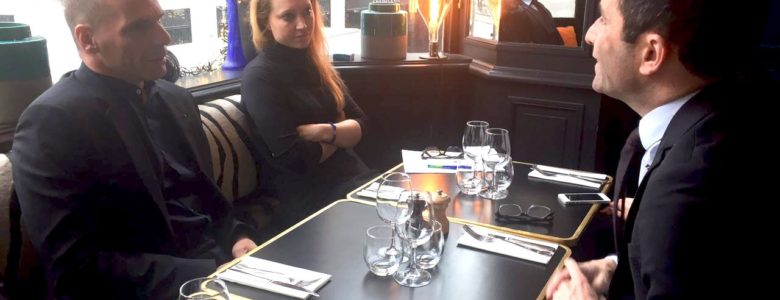
French Presidential Hopeful Benoît Hamon Embraces DiEM25
PARIS (FRANCE).- “We do not have to accept everything the European Central Bank and the European Commision put on the table,” said France’s former Education Minister Benoît Hamon after a lunch meeting with DiEM25’s co-founder Yanis Varoufakis. “There is a third way,” he added, “a way that Yanis Varoufakis is helping to shape.”
Échanges avec @yanisvaroufakis sur la nécessité d'une alliance des progressistes européens. #ConvergencesSociales (1/2) pic.twitter.com/5rGU5FiZeT
— Benoît Hamon (@benoithamon) January 9, 2017
Hamon, a rising star on the socialist camp and supporter of a basic income for all French citizens, is currently racing for the party’s primary that will choose its presidential candidate at the end of this month.
“I am particularly sensitive to Mr. Varoufakis’ concept of “constructive disobedience”
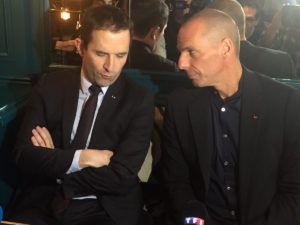
Benoît Hamon and Yanis Varoufakis.
“I am particularly sensitive to Mr. Varoufakis’ concept of “constructive disobedience,” said Hamon, who also warned about the dangers of the eurosceptic narrative his opponents on the left, Jean-Luc Mélenchon and Arnaud Montebourg, are fueling. “We start questioning the common currency, then tomorrow it will be [Europe’s] open borders [that will be in question]… I do not know where this ends,” he lamented.
According to Hamond, walking away from the European project may actually send voters into the arms of the extreme-right’s Front National.
“It is important to understand,” Hamon stressed, “that it is possible to favour both: European cooperation and social progress.”
Related articles:
Le Monde
Le Parisien
Le Journal du Centre
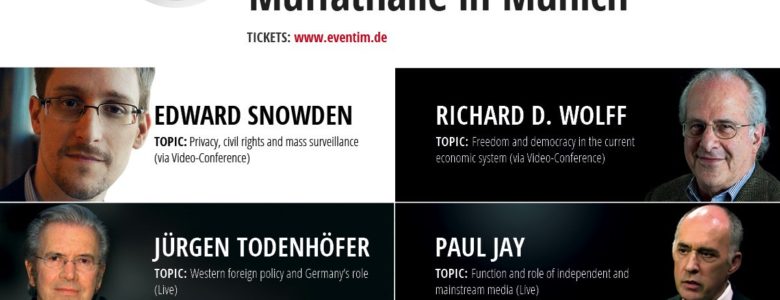
Freedom & Democracy: Global Issues in Context – with Edward Snowden & Srećko Horvat
At the end of the Second World War a new era of globalization of capital and production began that continues on today and is enforced through manifold free trade agreements. Another turning point was 9/11. Since then, an increased military presence and an expanding security apparatus is leading to more surveillance and violence in the name of national security.
In addition, the disparity between rich and poor is growing ever larger and global society is experiencing the increasing regression of stability and civil rights. The current wars in the Middle East, the possible ignition of a new Cold War, terrorism and surveillance, financial crises, poverty as well as the flight of refugees or environmental catastrophe are all unfortunate and disastrous signs of our time.
Are these events interconnected? Can we see a pattern? Are they taken out of context or completely ignored? We will speak with international experts about supposed structures and connections to find out if and how we can make a change for the better of all. LIVE IN MUNICH. On the 15th of JANUARY, 2017.
THIS EVENT WILL BE BROADCASTED VIA INTERNET LIVE STREAM. THE LINK WILL BE AVAILABLE ON ACTVISM’S WEBSITE, YOUTUBE CHANNEL AND FACEBOOK PAGE ON THE EVENT DAY.
Our Topics:
- Privacy, civil rights and mass surveillance
- Western foreign policy and Germany’s role
- US foreign policy and the military industrial complex
- Freedom and democracy in the current economic system
- Function and role of independent and mainstream media
- Development, possibilities and urgency of political activism and grassroots movements
EDWARD SNOWDEN

Edward Snowden is a former intelligence officer who served the CIA, NSA, and DIA for nearly a decade as a subject matter expert on technology and cybersecurity. In 2013, he revealed that the NSA was seizing the private records of billions of individuals who had not been suspected of any wrongdoing, resulting in the most significant reforms to US surveillance policy since 1978. He has received awards for courage, integrity, and public service, and was named the top global thinker of 2013 by Foreign Policy magazine. Today, he works on methods of enforcing human rights through the application and development of new technologies. He joined the board of Freedom of the Press Foundation in February 2014.
Snowden will talk about privacy, civil rights and the surveillance state.
JÜRGEN TODENHÖFER

Jürgen Todenhöfer is a German publicist, doctor of law, former media manager and politician. He first entered German parliament for the CDU (Christian Social Democrats) in 1972, visited dictator Augusto Pinochet in Chile in order to secure the release of political prisoners there, pushed for a reduction in US and Russian ICBM’s (intercontinental ballistic missiles) and supported the politics of German reunification. Todenhöfer was the first CDU politician to make public his entire income and was working as the head of Hubert Burda Media. In 1990 he retired from politics and public life and only resurfaced after the terror attacks of 9/11. Since then he has openly criticized the American interventions in Afghanistan and Iraq in many books. He has traveled to war zones, the countries of the “Arab Spring” and the so-called “Islamic State”, has interviewed Baschar al-Assad and the Ayatollahs of Iran, and was present in Gaza during the Israeli assault known as “Operation Protective Edge”.
Todenhöfer published numerous best-selling books. His books center around his conviction that peace should be achieved through negotiations only. In 2003 he wrote “Who cries for Abdul and Tanaya?”, decribing the war-stricken lives of a young Afghan boy and a young Iraqi girl. He wrote “Andy and Marwa” in 2005 wherein he describes the fate of the American Andy and the Iraqi girl Marwa during the Iraq war. It was followed in 2008 by the bestseller “Why do you kill, Zaid ?” which was followed most recently in 2013 by his last book “Thou shalt not kill”.
Jürgen Todenhöfer will address questions regarding Western foreign policy and Germany’s role.
JEREMY SCAHILL

Jeremy Scahill is one of the three founding editors of The Intercept. He is an investigative reporter, war correspondent, and author of the international bestselling books Dirty Wars: The World Is a Battlefield and Blackwater: The Rise of the World’s Most Powerful Mercenary Army. He has reported from Afghanistan, Iraq, Somalia, Yemen, Nigeria, the former Yugoslavia, and elsewhere across the globe. Scahill has served as the national security correspondent for The Nation and Democracy Now!.
Scahill’s work has sparked several congressional investigations and won some of journalism’s highest honors. He was twice awarded the prestigious George Polk Award, in 1998 for foreign reporting and in 2008 for Blackwater. Scahill is a producer and writer of the award-winning film Dirty Wars, which premiered at the 2013 Sundance Film Festival and was nominated for an Academy Award.
Jeremy Scahill will address questions regarding US foreign policy and the military industrial complex.
RICHARD D. WOLFF

Richard D. Wolff is Professor of Economics Emeritus, University of Massachusetts, Amherst. He is currently a Visiting Professor in the Graduate Program in International Affairs of the New School University in New York. Wolff has also taught economics at Yale University, City University of New York, and the University of Paris I (Sorbonne). He is a co-founder and contributor of Democracy at Work, a non-profit organization that promotes democratic workplaces as a key part of a transition to a better economic system.
Wolff has published many books and articles, both scholarly and popular. Most recently, in 2012, he published the books Democracy at Work: A Cure for Capitalism (Haymarket Books) and Contending Economic Theories: Neoclassical, Keynesian, and Marxian, with Stephen Resnick (Cambridge, MA, and London: MIT University Press). He writes regularly for Truthout.org. He has been interviewed on The Charlie Rose Show, Up with Chris Hayes, Real Time with Bill Maher, Democracy Now!, Al-Jazeera English, Thom Hartmann, NPR, Alternative Radio, and many other radio and TV programs in the United States and abroad. The New York Times Magazine has named him “America’s most prominent Marxist economist.
Wolff will talk about freedom and democracy in the political economy.
PAUL JAY

Paul Jay is the CEO and Senior Editor of The Real News Network (TRNN). He leads a staff of forty people covering international and U.S. news, including the new Baltimore Bureau. TRNN began in Toronto in 2007 and is now based in Baltimore, MD. TRNN is a non-profit, viewer-supported daily video-news and documentary service. It doesn’t accept advertising, government or corporate funding. Instead, it’s sustained by viewer donations and earned revenue.
Paul is host of the Real News show Reality Asserts Itself which features in-depth biographical and political interviews with some of the leading minds of our time. He is now heading up an initiative to create a Global Climate Bureau that will produce daily news about the urgency of, and solutions to, the climate change crisis. He is Executive Producer of the new documentary film “The Doubt Machine: the Koch Brothers war on climate science” narrated by Emma Thompson. Jay is also an award-winning filmmaker and was founding chair of Hot Doc! International Documentary Film Festival and executive producer for ten years of the CBC daily current affairs show counterSpin.
Paul Jay will address questions concerning independent and mainstream media and the role they play in our society.
SRECKO HORVAT
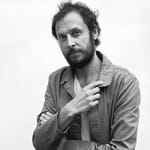
Srećko Horvat, philosopher and activist, born in Yugoslavia (1983), without permanent address. He published more than 10 books translated into more than 15 languages, most recently: “What Does Europe Want?” (together with Slavoj Žižek, Columbia University Press, 2014), “Welcome to the Desert of Post-Socialism” (Verso, 2015) and “The Radicality of Love” (Polity Press, 2015). He regularly publishes articles in the Guardian, New York Times and Al Jazeera.
He was one of the founders of the Subversive Festival and has participated in many movements, from occupations to the World Social Forum. Together with Greece’s ex-finance minister Yanis Varoufakis he founded Democracy in Europe Movement (DiEM25): www.diem25.org
Srećko Horvat will talk about the role of political activism and grassroots movements.
ZAIN RAZA
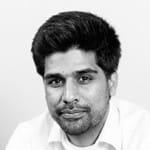
Zain Raza is the founder and senior editor of acTVism Munich. He is a journalist, activist and cultural promoter in Munich. As an activist he co-organized a number of demonstrations in Munich which included “March Against Monstanto”, and as a cultural promoter he brought hundreds of people together with his event “Pakistani on the Menu” that presented food, arts and music from many different cultures.
As a writer and journalist, Raza’s research on political and economic issues was featured on the Tribune Express which he left in 2013 to found acTVism Munich.
Since acTVim Munich’s founding Raza has directly overseen and directed the production of over 100 videos that include interviews and events with experts such as Noam Chomsky, Glenn Greenwald, Yanis Varoufakis, Hans-Christian Ströbele, Katja Kipping, Abby Martin, Sarah Harrison, Annie Machon, Ray McGovern, William Binney, Thomas Drake and many others. To find out more about Zain’s background, click here.
INFOS TO THE EVENT:
- DATE: 15th January, 2017.
- LOCATION: Muffatwerk, Zellstraße 4, 81667 Munich
- TICKETS: SOLD OUT
- LANGUAGE: English
- PUBLISHING: Internet Live Stream, video release on YouTube in German and Englsih and audio broadcasting via Radio München and Radio Lora
- Facebook: https://www.facebook.com/events/1175890255800670/
For more information, please visit:
acTVism: http://www.actvism.org/en/
Muffathalle: http://www.muffatwerk.de/
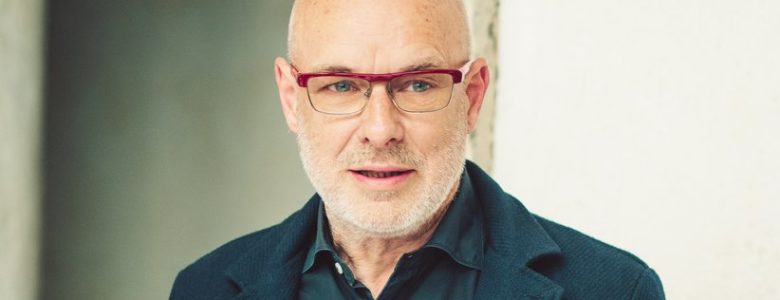
Brian Eno: "People are rethinking what democracy means"
By Brian Eno
The consensus among most of my friends seems to be that 2016 was a terrible year, and the beginning of a long decline into something we don’t even want to imagine.
2016 was indeed a pretty rough year, but I wonder if it’s the end – not the beginning – of a long decline. Or at least the beginning of the end….for I think we’ve been in decline for about 40 years, enduring a slow process of de-civilisation, but not really quite noticing it until now. I’m reminded of that thing about the frog placed in a pan of slowly heating water…
This decline includes the transition from secure employment to precarious employment, the destruction of unions and the shrinkage of workers’ rights, zero hour contracts, the dismantling of local government, a health service falling apart, an underfunded education system ruled by meaningless exam results and league tables, the increasingly acceptable stigmatisation of immigrants, knee-jerk nationalism, and the concentration of prejudice enabled by social media and the internet.
This process of decivilisation grew out of an ideology which sneered at social generosity and championed a sort of righteous selfishness. (Thatcher: “Poverty is a personality defect”. Ayn Rand: “Altruism is evil”). The emphasis on unrestrained individualism has had two effects: the creation of a huge amount of wealth, and the funnelling of it into fewer and fewer hands. Right now the 62 richest people in the world are as wealthy as the bottom half of its population combined. The Thatcher/Reagan fantasy that all this wealth would ‘trickle down’ and enrich everybody else simply hasn’t transpired. In fact the reverse has happened: the real wages of most people have been in decline for at least two decades, while at the same time their prospects – and the prospects for their children – look dimmer and dimmer. No wonder people are angry, and turning away from business-as-usual government for solutions. When governments pay most attention to whoever has most money, the huge wealth inequalities we now see make a mockery of the idea of democracy. As George Monbiot said: “The pen may be mightier than the sword, but the purse is mightier than the pen”.
People are rethinking what democracy means, what society means and what we need to do to make them work again. People are thinking hard, and, most importantly, thinking out loud, together.
Last year people started waking up to this. A lot of them, in their anger, grabbed the nearest Trump-like object and hit the Establishment over the head with it. But those were just the most conspicuous, media-tasty awakenings. Meanwhile there’s been a quieter but equally powerful stirring: people are rethinking what democracy means, what society means and what we need to do to make them work again. People are thinking hard, and, most importantly, thinking out loud, together. I think we underwent a mass disillusionment in 2016, and finally realised it’s time to jump out of the saucepan.
This is the start of something big. It will involve engagement: not just tweets and likes and swipes, but thoughtful and creative social and political action too. It will involve realising that some things we’ve taken for granted – some semblance of truth in reporting, for example – can no longer be expected for free. If we want good reporting and good analysis, we’ll have to pay for it. That means MONEY: direct financial support for the publications and websites struggling to tell the non-corporate, non-establishment side of the story. In the same way if we want happy and creative children we need to take charge of education, not leave it to ideologues and bottom-liners. If we want social generosity, then we must pay our taxes and get rid of our tax havens. And if we want thoughtful politicians, we should stop supporting merely charismatic ones.
Inequality eats away at the heart of a society, breeding disdain, resentment, envy, suspicion, bullying, arrogance and callousness. If we want any decent kind of future we have to push away from that, and I think we’re starting to.
There’s so much to do, so many possibilities. 2017 should be a surprising year.
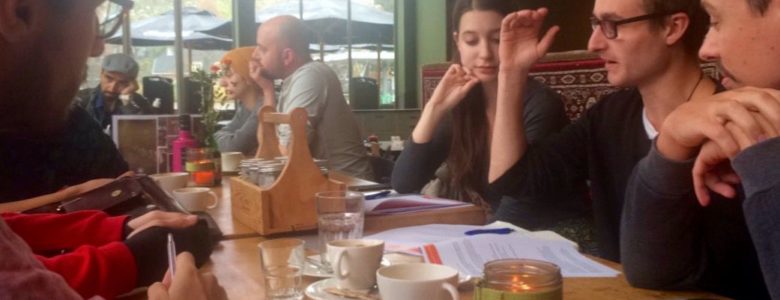
DiEM25 in Geert Wilders’ Backyard
The biggest step towards European Union so far took place in Maastricht, when the eponymous Treaty was signed by the member states and the European Community became the European Union. The town with a population of approximately 122,000 inhabitants is also located right in the backyard of the right-wing populist Geert Wilders and his EU-critical PVV party.
The fact that DiEM25 can count on a Spontaneous Collective in Maastricht is due largely to the work of the two coordinators Dominik Leusder and Cihan Erkli and their strong commitment to the project.
Dominik closely followed the negotiations with Greece during the Euro crisis. How Greece and its people have been treated caused him a lot of frustration and a strong desire to develop an alternative. Before DiEM25 was launched, Yanis’ book “A New Deal for Europe” came into his hands. Later he read through DiEM’s website. “I found that the language was so different. The Manifesto appealed to me and I wanted to be involved. I felt both this anger and that this movement for democracy has momentum on its side,” explained the political philosophy student during a conversation via Skype.
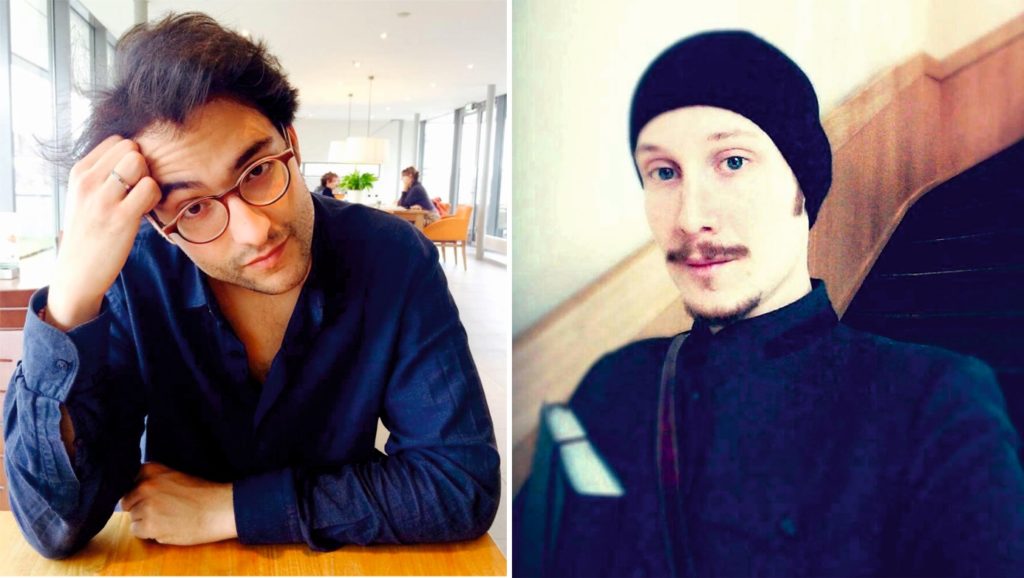
He organized a few meetings about Universal Basic Income and about Brexit, among other topics, hoping to find people who thought and felt the same way. Up to 15 people participated on a number of occasions, but these were primarily international students. “DiEM needs a solid foundation in Maastricht and that is why I wanted to find people who actually live in Maastricht and not just those who merely stay until the end of their studies,” explained Dominik.
Finished with his own studies, it should have been time for him to move on but he decided to stay another year in order to dedicate himself to the establishment of a solid local DiEM group. He is strongly supported by Cihan, who stayed for a longer period in Turkey after the coup attempt.
Maastricht is a small and very conservative place. It is not by chance that Geert Wilders is from this region. Many Maastrichters laugh when they hear terms like ‘revolution’ and ‘change’. In the formerly prosperous city a precariat has formed in the last decades, unsecured working conditions and lack of prospects prevail. The local dialect is an additional barrier in contact with the local population. “Especially the new precariat and those in such a region must be involved in our pan-European movement,” emphasizes Dominik. Yet, one can also feel a new democratic spirit in the city. This and the fact that 20 people had finally taken part in a meeting on a rainy Sunday morning made him confident.
Dominik carries out practically all promotion single-handedly. “We are still financing everything ourselves, which is sometimes a problem. It is true that one can compensate the lack of financial resources with creativity, but not always. ”
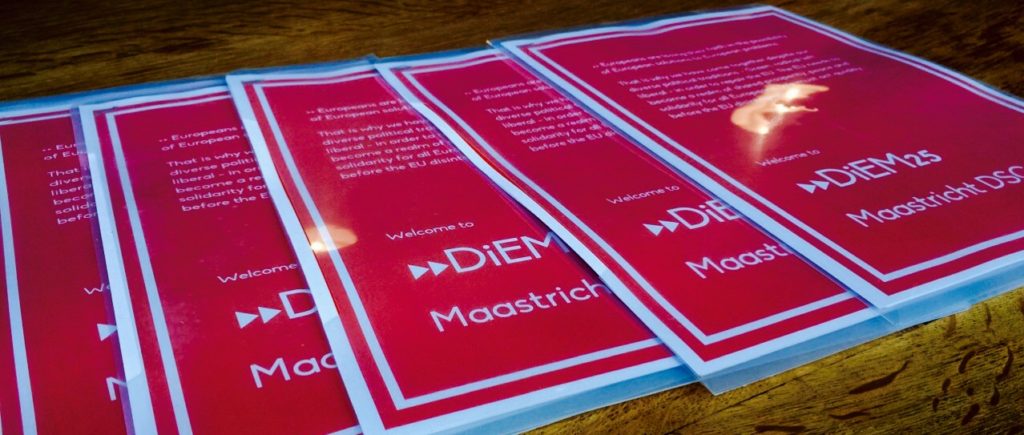
The group is currently working intensively on the strategy papers, with more than 20 people writing. This is a phase where we can directly influence DiEM25 policy and it also helps to integrate people into the movement. When asked about the internal organization of DiEM25, Dominik says: “there is a minimum of coordination, but otherwise a Collective can freely do what it wants within the manifesto’s framework. Not everything is controlled from above and DiEM is very transparent. ”
DSC Maastricht’s recipe for success is to address people directly, to go to the people and tell them to come to the meeting. It does not work only with sterile and anonymous invitations via social networks.
“If it did not work here, it encouraged me that DiEM25 succeeded in other places and that new people would join,” he concluded. A sense of community makes us stronger, and while it may sound like a platitude, given the atomized society that we live in today, it cannot hurt to remind ourselves of this.
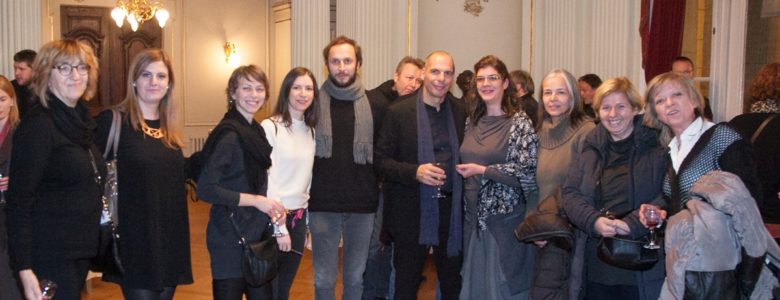
Report from DSC Belgrade 1
Since it’s forming in April 2016, DSC Belgrade has established a few priorities alongside a couple of questions that we discuss at our meetings, which take place weekly. We started as a small collective but now have 8 steady members and many more coming and going. We all met at DiEM25’s Forum, and we were (and still are) very aware of necessity of keeping the Manifesto ideas in mind and being specially careful not to slip into a populist local politics.
During our first days as a DiEM25 collective, we decided to support the Ne da(vi)mo Beograd protests which was followed by official DiEM25 support. Despite our wish to contribute more to the movement, at the same time we were not sure how far could we go without consultations. Besides that, not having a lot of members or a stable structure, we did not have much space to act.
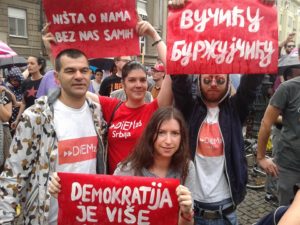
DSC Belgrade at Ne da(vi)mo Beograd protest
Members of DSC Belgrade had a pleasure to have Srećko Horvat as a guest at one of our regular meetings, having had the opportunity to meet him through his project of Philosophical Theatre, held both in Zagreb and in Belgrade.. This was an occasion to present Srećko with some of dilemmas and ideas that have been on our minds since the (not so distant) beginning.
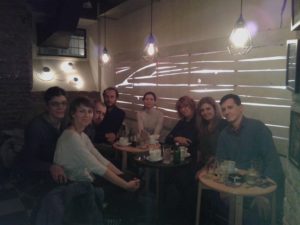
Srećko meets DSC Belgrade
Another important subject for us was the possibility of connecting to our movement to the Transparency campaign. Our suggestion is that we have a “sub campaign” which would ask for transparency of the documents, agreements, contracts etc. signed by our government during the process of integrations. One of the good examples of unfavorable deals and shady contracts, signed by our government, using public good for the sake of gaining the profit for few, is a construction of Beograd na vodi – Belgrade Waterfront Project. Other sad examples are factories sold to the “investors” where, along with the “new jobs”, workers recieved wages lower even than in China as well as unlimited shifts and no rights to form unions… Supporting the humiliated working class, forced to give up dignity in order to earn barely enough to pay for the rent and food for the month, is another of our priorities.
We were encouraged by Srećko to connect with other leftwing movements in Serbia and to try(even if it seems like a utopian dream)to overcome the ideological differences among existing movements. We aim to find a mutual goal, catch the wave of citizen movement forming around the Ne da(vi)mo Beograd protests, and to meet the members of Ne da(vi)mo Beograd initiative, considering the possibilities of further support and collaboration.
Also, members of DSC Belgrade wrote a draft document regarding presence of NATO forces in EU, aiming at necessity of demilitarization in order to have a free and democratic Europe.
One of the aims, to connect and meet with members from Zagreb, was fulfilled on December 4th, when five of DiEM25 members from Belgrade came to Zagreb, for the Philosophical Theatre with Yanis Varoufakis and Srećko Horvat, held in crowded Croatian National Theatre. Being among 1.000 people at that theatre venue that night, who came to hear Varoufakis speak, either already firm supporters or just out of curiosity, gave hope that another Europe is possible.
Carpe DiEM25!
